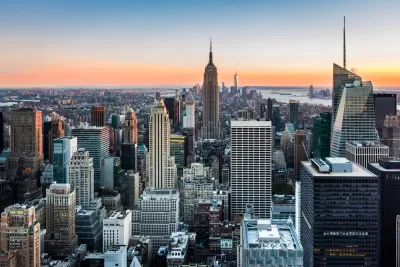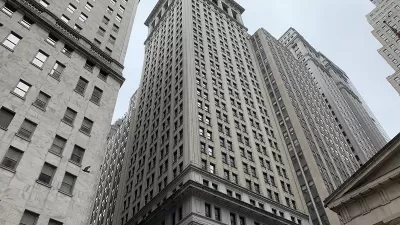With 90 percent of its usual commuters still working from home and a full return to the office highly unlikely, what will become of New York City's towering office buildings?

As companies evaluate the effects of work-from-home policies on their productivity and their bottom lines, there's no doubt that a sizable percentage of remote workers will continue working from home, and many of Manhattan's massive office buildings will "probably never be full again." With companies like Spotify, Twitter, and SalesForce announcing drastic reductions in their in-person operations, writes Matthew Haag in the New York Times, the landscape of Manhattan real estate will change drastically, even after the pandemic is over.
Manhattan is, writes Haag, "an island whose economy has been sustained, from the corner hot dog vendor to Broadway theaters, by more than 1.6 million commuters every day." At the moment, "about 90% of Manhattan office workers are working remotely," with less than half estimated to return to the office by September of this year. "The consequences for New York could be far-reaching, not just for the city’s restaurants, coffee shops and other small businesses, but for municipal finances, which depend heavily on commercial real estate." The loss of daily commuters "has caused the market value of commercial properties that include office buildings to plunge nearly 16 percent during the pandemic, triggering a sharp decline in tax revenue that pays for essential city services, from schools to sanitation."
Others see a light at the end of the tunnel. "The surge in available commercial real estate has actually been a boon for some new businesses that have been able to find spaces at rents that are lower than they were before the pandemic." Brian S. Waterman, executive vice chairman of commercial real estate services firm Newmark, expressed optimism that New York offices would see a "much fuller occupancy" by this fall. Some leading tech companies have also added to their footprint in the city, with Facebook securing 1 million square feet of office space and Apple adding two floors to their Midtown offices. A group of developers and landlords is also calling for the city and state to change zoning rules to allow the adaptive reuse of office buildings into apartments to make more efficient use of the space and alleviate the city's housing shortage.
FULL STORY: Remote Work Is Here to Stay. Manhattan May Never Be the Same.

Planetizen Federal Action Tracker
A weekly monitor of how Trump’s orders and actions are impacting planners and planning in America.

Maui's Vacation Rental Debate Turns Ugly
Verbal attacks, misinformation campaigns and fistfights plague a high-stakes debate to convert thousands of vacation rentals into long-term housing.

Restaurant Patios Were a Pandemic Win — Why Were They so Hard to Keep?
Social distancing requirements and changes in travel patterns prompted cities to pilot new uses for street and sidewalk space. Then it got complicated.

In California Battle of Housing vs. Environment, Housing Just Won
A new state law significantly limits the power of CEQA, an environmental review law that served as a powerful tool for blocking new development.

Boulder Eliminates Parking Minimums Citywide
Officials estimate the cost of building a single underground parking space at up to $100,000.

Orange County, Florida Adopts Largest US “Sprawl Repair” Code
The ‘Orange Code’ seeks to rectify decades of sprawl-inducing, car-oriented development.
Urban Design for Planners 1: Software Tools
This six-course series explores essential urban design concepts using open source software and equips planners with the tools they need to participate fully in the urban design process.
Planning for Universal Design
Learn the tools for implementing Universal Design in planning regulations.
Heyer Gruel & Associates PA
JM Goldson LLC
Custer County Colorado
City of Camden Redevelopment Agency
City of Astoria
Transportation Research & Education Center (TREC) at Portland State University
Jefferson Parish Government
Camden Redevelopment Agency
City of Claremont





























